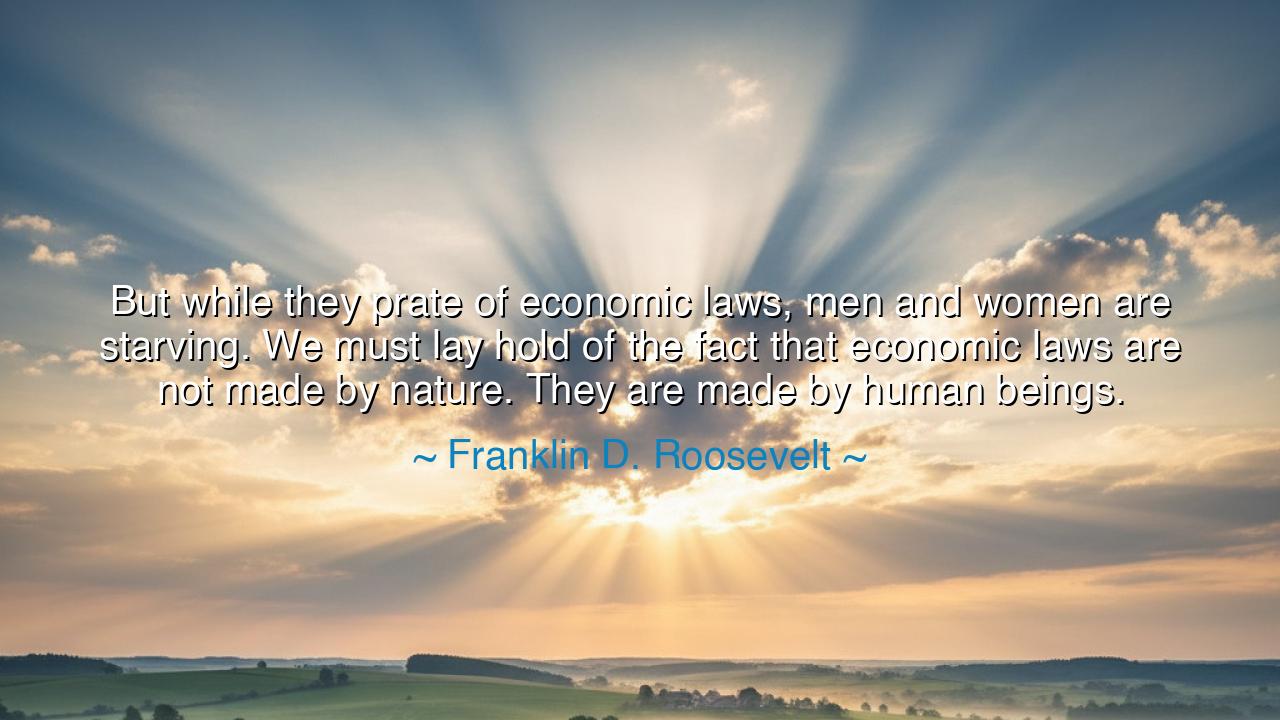
But while they prate of economic laws, men and women are
But while they prate of economic laws, men and women are starving. We must lay hold of the fact that economic laws are not made by nature. They are made by human beings.






In the words of Franklin D. Roosevelt, we hear the thunder of truth spoken against indifference: “But while they prate of economic laws, men and women are starving. We must lay hold of the fact that economic laws are not made by nature. They are made by human beings.” Here, Roosevelt unmasks the illusion that economics is some eternal and untouchable order, like the rising of the sun or the tides of the sea. Instead, he declares that these so-called laws are inventions of men, crafted by human minds, and thus can be re-shaped by human will. His words rise as a call to action: if people suffer under these laws, then it is within our power—and indeed our duty—to change them.
The meaning of this statement is piercing. Too often, those who hold power have hidden behind the notion that economic systems are fixed, inevitable, and beyond control, as if they were decrees of nature. But Roosevelt reveals the deception. He reminds us that the economy is a human creation, built by hands and governed by choices. If it produces hunger, despair, or ruin, it is not the fault of nature, but of human beings who refuse to correct what they themselves have forged. Thus, he places responsibility where it belongs: on the shoulders of society, and especially on those entrusted with leadership.
This truth came alive during the dark years of the Great Depression, when millions were cast into unemployment, and breadlines stretched endlessly through the cities of America. While some insisted that the downturn was the result of immutable economic forces, Roosevelt refused to bow to despair. Through his New Deal, he enacted policies that reshaped the very structure of the economy—creating jobs, reforming banks, and offering hope where there had been none. He demonstrated by deed what he proclaimed in words: economic laws are not chains forged by nature, but tools to be shaped for the welfare of humanity.
History holds many such lessons. In the early Industrial Age, when child labor filled the factories of Britain, defenders of the practice claimed it was an unavoidable necessity of economic survival. Yet reformers like Lord Shaftesbury fought to change these so-called "laws," proving that society could outlaw exploitation while still prospering. Once again, the veil was torn away: it was not nature that demanded the labor of children, but human greed. And it was human courage that put an end to it.
The lesson for us, O seekers of truth, is that no man or woman should ever accept cruelty or injustice as the unchangeable decree of economic law. Whenever you hear it said, “This is simply the way things are,” recall Roosevelt’s wisdom: such laws are the creation of human minds, and as such, they can be unmade and remade. To accept them blindly is to surrender to false idols. To challenge them with vision and compassion is to reclaim the true dignity of humanity.
Practically, this means that we must be vigilant. Question the structures that govern labor, wealth, and poverty. Ask who benefits and who suffers. If men and women are starving, then no matter how elegant the theory or how ancient the practice, the system is broken and must be reformed. Do not be deceived by those who dress injustice in the clothing of inevitability. Always remember: what human beings have built, human beings can change.
Thus let this wisdom be inscribed upon the scrolls of memory: economic laws are not nature’s laws. They are not eternal, nor unyielding, nor divine. They are human tools, to be judged by how they serve the human spirit. And if they bring hunger, they must be reshaped; if they bring despair, they must be reforged. For the true law above all others is this: the dignity of every human life. Let that be the law that governs nations.






AAdministratorAdministrator
Welcome, honored guests. Please leave a comment, we will respond soon